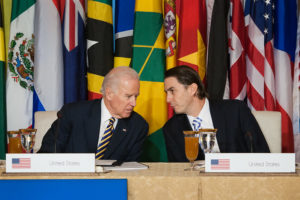
Then-Vice President Joe Biden chats with then-Special Envoy for international Energy Affairs Amos Hochstein before a multilateral meeting at the Caribbean Energy Security Summit at the U.S. Department of State in Washington, D.C. on January 26, 2015. [State Department photo/ Public Domain]
What incentive do investors have in an industry the ruling administration says it will “end?” Now, Biden administration chief energy advisor, Amos Hochstein is chastizing energy investors for returning value to shareholders rather than supporting the administration’s goals of increasing oil production in the short term to combat Russian export cuts. Derek Brower reports in the Financial Times:
“I think that the idea that financiers would tell companies in the United States not to increase production and to buy back shares and increase dividends when the profits are at all-time highs is outrageous,” said Amos Hochstein, President Biden’s international energy envoy. “It is not only un-American, it is so unfair to the American public.
“You want to pay dividends, pay dividends. You want to pay shareholders, pay shareholders. You want to get bonuses, do that, too. You could do all of that and still invest more. We are asking you to increase production and seize the moment.”
Hochstein’s comments came just days after the twinned launch of an EU embargo on seaborne Russian oil imports and a G7 price cap on the country’s oil in an attempt by western powers to stymie the Kremlin’s income while keeping its crude flowing to the global market.
Moscow has repeatedly vowed not to sell oil to countries complying with the cap. On Friday, President Vladimir Putin said Russia would “even think . . . about a possible cut in production”.
Hochstein said the Kremlin remained a menace to a “highly volatile” oil market and noted that Russia had repeatedly weaponised energy, including shutting gas supplies to Germany this year.
“I think about that all the time,” he said, referring to the Russian threat to stop oil exports. “But that risk exists with or without the price cap.”
Oil prices have swung wildly this year, spiking after Russia’s invasion to almost $140 a barrel in March, prompting the White House to release crude stored in emergency stockpiles in a bid to cool inflation.
Prices have tumbled in recent days on fears of a global recession, with international benchmark Brent settling at a year-to-date low of $76.10 per barrel on Friday.
But further turmoil in global energy was likely, especially in Europe’s gas market, as the stand-off between Putin and the west deepened, Hochstein said.
While an “unprecedented” effort by the US and other liquefied natural gas exporters had left Europe adequately stocked with the fuel for this winter, the loss of Russian pipeline imports would mean repeating the effort “winter by winter”, Hochstein warned.
Extra global LNG supplies would not arrive until plants being built in the US and Qatar came online later this decade, meaning “the mountain to climb [to build] gas stockpiles for next year is much higher”.
“We are really preparing and living from an energy perspective, in Europe and beyond, in a hand to mouth, step by step [way],” Hochstein said.
The longer-term solution was not to invest in more natural gas supply but to cut consumption of fossil fuels themselves, argued Hochstein, a former LNG executive.
“We have to peak the demand [for hydrocarbons] and then shrink it from there,” Hochstein said.
The Biden adviser’s comments will spark a reaction in the US shale sector, which has complained about mixed signals from a White House that has called for more fossil fuel output while also talking of cutting demand and speeding up a shift away from oil and gas.
But Hochstein denied any contradiction, saying the US could “do two things at the very same time, ensuring we have enough [oil] supply for a strong global economy, while accelerating the energy transition”.
Read more here.
